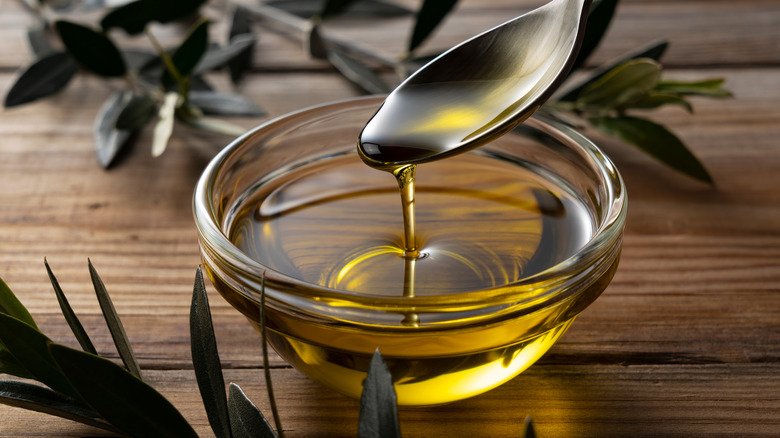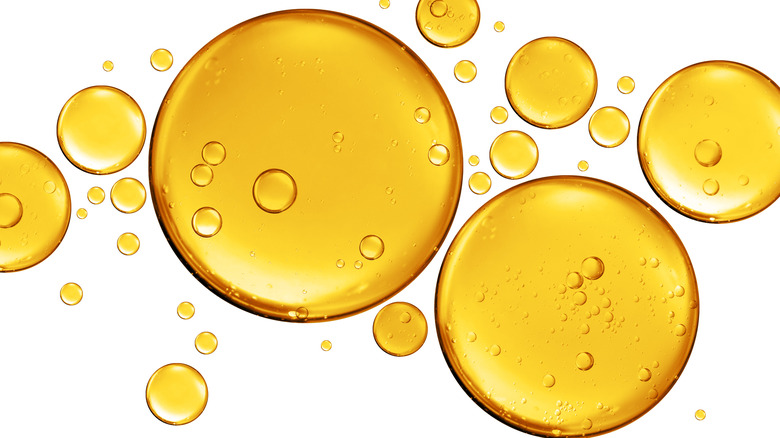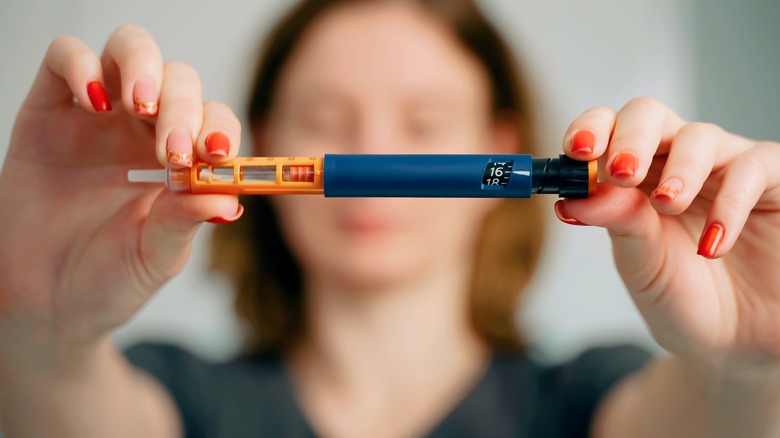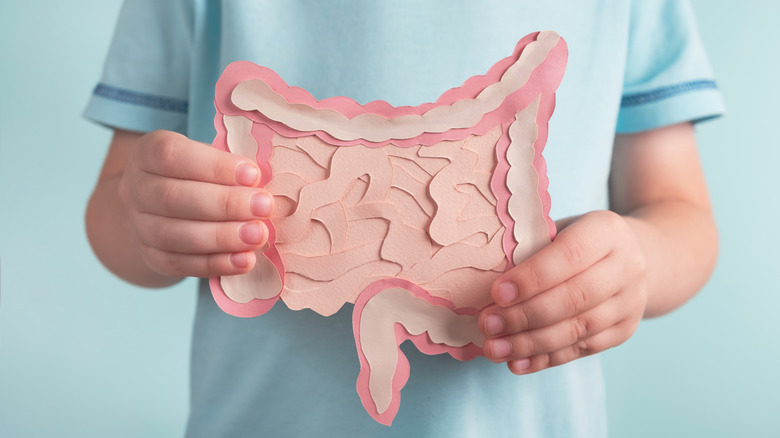Unexpected Health Benefits Of Olive Oil
Whether you're dressing up a salad, roasting vegetables in the oven, or sautéing your favorite source of protein on the stovetop, you might be inclined to reach for the bottle of olive oil. After all, most people would agree that olive oil is one of the more flavorful fats you can choose from. But you also might have heard that olive oil is super healthy for you — it's good for your heart, it reduces your risk of disease, it can help you lose weight, and on and on the list of benefits goes. So, is there legitimacy to any of this? And if there is, what is it about olive oil that does your body so much good? How can this golden-green-colored oil, which comes from pressing olives, really live up to the hype?
In short, yes, olive oil is indeed healthy. It benefits many organs and systems in your body. Here are several health benefits of olive oil that might surprise you.
Olive oil compared with other oils
If you've been paying attention to olive oil's reputation, you probably know people look to it as one of the healthiest oil options you can choose. But why? Well, as the North American Olive Oil Association explains, olive oil has two things going for it when it comes to its health-boosting powers — polyphenol compounds and monounsaturated fats, both of which are good for fighting disease. These beneficial compounds likely explain why populations in the Mediterranean region live so long. People in Mediterranean regions such as Greece and Italy rely on olive oil as a staple source of dietary fat, along with other foods like nuts and fatty fish.
Olive oil is comparable, calorie for calorie, to other fats. A 1-tablespoon serving of olive oil is 119 calories, all of which comes (of course) from fat. Canola oil is calorically similar at 120 calories, also all from fat content. You might be surprised that these vegetable-based oils have more calories than a 1-tablespoon serving of butter, which has 102 calories. Given that by calories alone it stacks up pretty similarly to other fats, which makes olive oil so special?
Its fat content is good for your heart
The important thing to understand about olive oil and its health benefits is that it's not just about calories or fat content. Even if olive oil has a similar calorie density and similar fat content compared with canola oil and butter, it's the type of fat that's so important. Olive oil has higher levels of monounsaturated fat, a specific type of fat that improves your cholesterol levels (via North American Olive Oil Association). There are other health benefits as well, the association explains, citing a study that showed a diet that includes olive oil — specifically, 4 tablespoons or more per day — reduces risk of developing heart disease. Olive oil might even help you avoid a heart attack or stroke better than an overall low-fat diet can. While olive oil is often looked to as the best source of monounsaturated fat, specifically a type of fatty acid called oleic acid, any food rich in oleic acid makes a beneficial swap in place of butter or an oil with a high saturated fat content. Britannica notes oleic acid is also found in oils made from sunflower, palm, and peanut.
It reduces your risk of type 2 diabetes
Heart disease isn't the only condition that olive oil can protect you against — it's also effective at reducing your risk of type 2 diabetes, as well as helping manage type 2 diabetes for those who are already diagnosed. When a person has type 2 diabetes, that means their body is not able to use insulin as well as someone without the condition. Because insulin is responsible for transporting blood glucose into your cells, type 2 diabetes can lead to a wide variety of complications (via the Mayo Clinic). When you include olive oil in your diet, you have the benefit of the phenolic compounds found in this specific type of fat. As the Olive Wellness Institute explains, these phenolic compounds help your body metabolize glucose and use insulin more successfully. It's for this reason that compared with a low-fat diet, a diet that includes olive oil is much better for staving off diabetes and, for those who already have diabetes, managing its symptoms.
Olive oil reduces inflammation
Your body is a pretty powerful thing. When you're sick or hurt, your immune system reacts and works to bring you back to good health. The Cleveland Clinic explains that these cells fighting on your body's behalf are called inflammatory cells, and even though they're good when they're working acutely, they can sometimes become chronic, even when there is no sickness or injury your body needs protection from. As it turns out, olive oil's antioxidant profile can help fight this chronic inflammation, per Harvard Health Publishing. Olive oil's primary antioxidant with anti-inflammatory benefits is oleocanthal, and research has found that oleocanthal has similar effects as the drug ibuprofen, according to a review published in Current Pharmaceutical Design. In addition to fighting inflammation, these antioxidants serve another important role in the body. As their name implies, they fight oxidative damage your body sustains because of free radicals, which are linked to a variety of health conditions and risks, including cancer (via Medical News Today).
Olive oil contains vitamin E for good skin
If you've ever been reading the label of your favorite lotion or skincare product, you might have noticed that it contains vitamin E, a nutrient touted as being good for the skin. It's true — vitamin E benefits your skin by making it softer and moister, and by protecting it from damage caused by the sun (via the Cleveland Clinic). But vitamin E isn't just something you should be getting topically. You should also be taking in vitamin E through your diet. The Olive Oil Times explains that olive oil contains vitamin E, which will not only help your skin but also your hair, eyes, and lungs. It's also good for fighting against Alzheimer's and other neurological conditions. Because vitamin E is fat-soluble (that is, it's absorbed into your body through fat molecules), it's good that you're getting it from a fat-based source like olive oil — this means your body can absorb and use this vitamin E more effectively than if it were consumed without fat.
Olive oil has vitamin K for strong bones
It's not just your skin that will be stronger and healthier thanks to olive oil — your bones will be stronger and healthier as well. The Olive Wellness Institute cites a study that showed people with large amounts of olive oil in their diet didn't have as great a risk of bone fractures as those who didn't consume as much olive oil. The thinking is that olive oil stops calcium from breaking down in your body, a process known as bone reabsorption. Instead, olive oil actually increases the formation of bone, so your skeletal system is stronger. The Olive Oil Times attributes this boost of bone health to the vitamin K in olive oil, as your body uses vitamin K to fortify calcium. Like vitamin E, vitamin K is fat-soluble, so it's best absorbed when you get it from a fat source like olive oil, which contains about 10% of the vitamin K an adult needs in just one serving.
Olive oil improves your feelings of satiety
Have you ever eaten a meal — maybe a low-fat meal — that left you feeling hungry even after you were done? Or if it did fill you up, you were hungry again only a few minutes later. Blame the fact that the dinner was low in fat. As Food Navigator explains, dietary fat has been shown to help you feel full and keep you feeling full until your next meal. In one cited study, people who consumed olive oil ate fewer calories overall even when compared with people who had a different type of fat in their diet, such as rapeseed oil or butter. What makes olive oil so special? It might be that olive oil's aroma is what helps you feel full, as a follow-up study found that simply using olive oil aroma extracts, and not the oil itself, had the same effect. So, if you're trying to achieve or maintain a healthy weight, don't be afraid to drizzle a moderate amount of olive oil on your food—it may add some calories to that meal, but you're likely to eat fewer calories total throughout the day.
Olive oil helps your body absorb certain nutrients
By now, you already know that vitamin E and vitamin K are absorbed into your body through fat. They're what are known as fat-soluble vitamins, as opposed to water-soluble vitamins, which are absorbed into your body via — you guessed it — water. Bailey Medical Center lists that it's not just vitamins E and K that are fat-soluble, but vitamins A and D as well. Therefore, if you want to make sure your body is getting as much of these vitamins as possible, you should eat them with sources of fat. Adding olive oil to a salad that's rich in nutrients gives your body the fat it needs in this situation. The nutrients will be absorbed into the fat molecules and ultimately stored in your body's tissue for later use (unlike water-soluble vitamins, which are flushed from the body via urine). Note, however, that because fat-soluble vitamins are stored by your body, you have to be careful that you don't consume too much.
Olive oil reduces risk of Alzheimer's
What if olive oil consumption could protect the brain from Alzheimer's? That may be the case, though it's not explicitly clear why. The neurodegenerative disease Alzheimer's is a heartbreaking one not only for those afflicted by it and their loved ones, but also for doctors — as USA Today points out, there's a high number of deaths caused by Alzheimer's, and no current strategies for preventing it in those who are at risk. Hence, it's so groundbreaking to think that consuming olive oil every day might help stave off Alzheimer's and other neurodegenerative diseases, including Parkinson's. The Olive Wellness Institute attributes this to the phenolic compounds your body yields from olive oil. The phenolic compounds fight brain degeneration and decline, helping your brain stay strong and functional with a sharp memory. According to a 28-year study published in the Journal of the American College of Cardiology in 2022, higher olive oil consumption was found to reduce the risk of neurodegenerative disease by as much as 29%, higher than the reduction in risk of cancer death (17%) and respiratory disease death (18%).
Olive oil can boost your mood
We all feel down from time to time. And even though olive oil might not be on your list of what you typically think of as comfort foods (you know, like macaroni and cheese or ice cream), there's scientific research that shows olive oil might be one really good mood boost for those who eat it. The North American Olive Oil Association points to several studies over the years that show the Mediterranean Diet, which contains abundant amounts of olive oil and is often celebrated for its many health benefits, could be good for people who struggle with depression. Want specifics? The association highlights one study published in BMC Medicine in January 2017 that shows 30% of the test subjects who followed the Mediterranean diet for 12 weeks actually saw a decrease in the symptoms of their moderate to severe depression. One reason for this might be, as the North American Olive Oil Association explains, that fats like olive oil are good for your central nervous system, which means your body is better able to transmit serotonin throughout your body.
Olive oil improves overall longevity
After hearing all of these myriad health benefits, would it really surprise you to find out that olive oil improves your overall longevity? In other words, it helps you live a longer life. It's important to note that there's nothing more than observational evidence that olive oil helps you live longer, but Harvard Health Publishing cites two studies that show a link between consuming lots of olive oil and a reduced risk of early death, particularly if the olive oil replaced other fat sources, such as butter, mayonnaise, or margarine. It doesn't even require a full 1-tablespoon serving of olive oil — Harvard's research showed people had only a little more than a half-teaspoon every day over the course of nearly three decades and risk of death went down by 19%. Most likely, this is because of the many health risks that are lessened by olive oil consumption, including the risk of heart disease and the risk of cancer.
Olive oil may help your body fight off harmful bacteria
Here's another health benefit to consider about olive oil: It might be able to fight the bacteria Helicobacter pylori, better known simply as H. pylori, which can infect your stomach and cause peptic ulcers, according to the Mayo Clinic. Although this infection can be (and often is) treated with antibiotics, such medicines might not be necessary, according to one study published in Helicobacter in April 2017. Although eradication rates were as low as 10% in some test subjects, it was as high as 40% in others. This research isn't conclusive and further studies are required to confirm olive oil's antibacterial potential, but considering olive oil has so many other health benefits, there's no drawback to consuming it — especially when many of those who contract the infection in childhood might go for a long time without developing symptoms from it, according to the Mayo Clinic.
You don't need to worry about overheating olive oil
If you've cooked with olive oil before, you might have heard people tell you that olive oil shouldn't be heated up — they say it produces harmful compounds when exposed to a lot of heat. It turns out these are misconceptions. Olive oil is a great cooking option and doesn't lose its health benefits when you warm it up to high temps, according to the North American Olive Oil Association. In fact, olive oil has a smoke point (the temperature at which an oil will begin to smoke) between 365 degrees F and 410 degrees F, which are high temperatures, making it a great choice for all kinds of cooking methods. And olive oil is actually known to produce fewer polar compounds — damaging chemical compounds that can be formed when oils are heated — than most any other oil, even those with higher smoke points. This is because of those health-protecting attributes like antioxidants and monounsaturated fats, which stop olive oil from breaking down or oxidizing.














